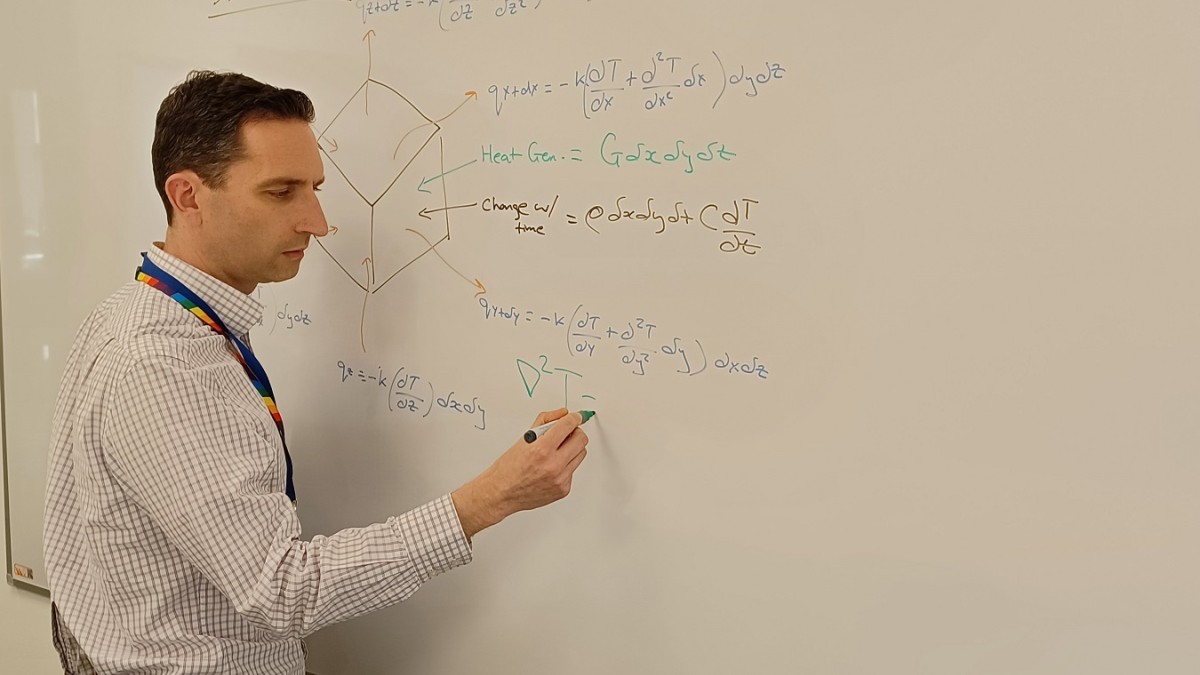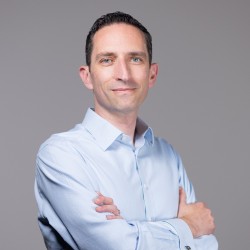Visiting Professor gives students an industry perspective
Two years into his Visiting Professorship at Surrey, Dr Graham Hawkes tells us about the skills he’s teaching students to prepare them for industry and the things he’s learned from his time at Surrey.

Dr Graham Hawkes teaches students how to apply the principles they've learned to industry problems.
How did you come to teach at Surrey?
I’m a Visiting Professor in the School of Mechanical Engineering Sciences which means I teach part-time at the University. The purpose of the Visiting Professorship, which is enabled by a grant from the Royal Academy of Engineering, is to prepare students for industry by helping them develop their collaboration, communication and technical advisory skills.
Outside of the University, I am Engineering Manager within Energy Technology at Frazer-Nash Consultancy, a KBR Company Technical Fellow in Fluid Dynamics and Wind, and Chair of the IMechE’s Renewable Power Committee.
What do you teach and what’s your approach?
On the technical side, I’ve developed and delivered a series of lectures on the theme of ‘Industrial Applications of…’. These lectures complement the core technical courses over the years such as numerical methods, fluid mechanics and heat transfer.
Within these lectures I show students how to apply the methods that they’ve learnt in an industrial context. My approach is to introduce technical problems I’ve encountered that presented themselves as rather vague from the outset. We then work to put a framework around the problem to make it tractable using the methods that the students have learnt. Once we have this framework we ask: ‘Where does this work?’, ‘What are the limitations?’, ‘How could we test if we are right?’, ‘How would uncertainty or variability influence this?’, ‘What advice do we give based on the results?’ It is very interactive.
I also give some wider briefing lectures related to my area of specialism, for example on energy transition and the renewables industry.
How else do you support students?
I teach students a range of enabling skills and concepts such as project management, communication, project finance, intellectual property and quality assurance. This is put into practice with my support students doing their third-year group projects. I start by observing groups with their supervisors and follow up with some group coaching. Here I operate in a ‘project friend’ role and focus my efforts on whatever the groups would like to work on and improve.
"Bonding time is really important for good teamwork. This was a particular challenge directly after the pandemic when students didn’t know each other as well as they normally would but were suddenly thrust together as a team to design an aircraft or race car. My first question in group coaching session would be: ‘Have you been for a coffee together?’ Understandably this was often met with some surprise by the students … but I’m pretty sure they went for a coffee afterwards and learnt more about their colleagues." - Dr Graham Hawkes
Another aspect of my role at Surrey is supporting students who want to go on placement. I’m currently preparing a briefing which will give the employer’s perspective, talking about what I think ‘good’ looks like in terms of a prospective placement student.
What’s the most important thing an engineering student needs to learn?
Being a good engineer is about far more than doing good sums, it’s about having a balance of technical and enabling skills. Academia is rightly a safe space to learn, but in the working world there’s additional complexity arising from working with multiple stakeholders, commercial aspects of projects and stringent requirements for accuracy and rigour.
So arguably the most important thing I teach is how to operate with integrity as a professional engineer. This brings all these concepts together and I introduce the Statement of Ethical Principles as jointly developed by the Royal Academy of Engineering and Engineering Council. This has four fundamental principles: operating with honesty; doing things for the wider good; accuracy and rigour; and leadership and communication.
And is there anything you’ve learned from teaching at Surrey?
Yes, I’m continually amazed by the students’ ability and fearlessness when writing code and integrating hardware, for example when designing robots to navigate tricky obstacle courses.
The Surrey course has a fantastic design-centred ethos and as a specialist engineer rather than a design engineer myself, this has been a great refresher for me. I’ve also seen these processes applied to interesting and highly topical challenges such as designing a hydrogen-fuelled aircraft which was the subject of last year’s Year 3 project brief.
Discover our courses in mechanical engineering sciences.
